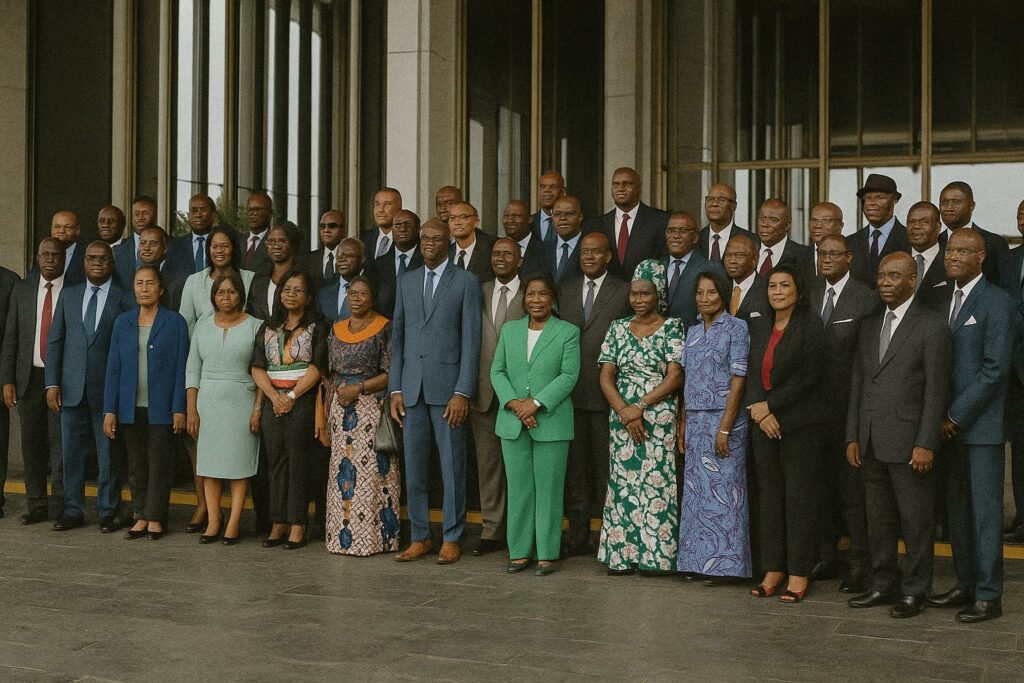Participatory Governance Gains Traction in Basic Education
By convening more than one hundred officials and practitioners in Kintélé, the Ministry of Pre-School, Primary, Secondary Education and Literacy signalled that community-anchored governance has moved from aspiration to formal policy. The three-day workshop, presided over by Minister Jean-Luc Mouthou and facilitated by the World Bank-financed Accelerate Institutional Governance and Reform Programme, crystallised consensus around School Management Committees—known locally as Comités de gestion, or Coges—destined to become a cornerstone of public-school administration.
Coges reflect a broader continental trend that UNESCO has repeatedly endorsed as a catalyst for accountability and parental engagement (UNESCO 2023). Yet their Congolese iteration carries a distinctive imprimatur: it is embedded in the national decentralisation roadmap championed by President Denis Sassou Nguesso, promising to align pedagogical quality with the constitutional principle of proximity governance.
A Governance Model Nurtured by Domestic Consensus and International Support
The Kintélé workshop gathered delegates from the ministries of Interior, Finance and Technical Education, alongside prefectural and municipal leaders—an inter-ministerial constellation that observers from the United Nations Development Programme described as ‘rarely achieved in comparable reforms’ (UNDP 2024). The configuration demonstrates that Brazzaville seeks to embed education reform within the wider state-modernisation matrix rather than confining it to sectoral silos.
Financial and advisory backing from the World Bank, channelled through PAGIR, has provided the reform with both resources and a performance-oriented ethos. According to a preliminary World Bank implementation note, disbursement will be tied to measurable indicators such as the frequency of committee meetings, gender balance among members and timely publication of school accounts (World Bank 2025). This results-based modality is intended to pre-empt the budgetary drift that historically plagued school-level initiatives across Central Africa.
Legal Innovations Translating Reform Into Day-to-Day Practice
The December 2024 decree that institutionalised Coges clarifies their dual mandate of deliberation and oversight. It grants committees statutory authority to validate small-scale procurement, monitor teacher attendance and endorse annual development plans, while leaving pedagogical supervision under ministerial purview. Jacques Ississongo, Prefect Inspector General of Territorial Administration, underscored that the text ‘weaves participatory democracy into the fabric of everyday schooling’—a formulation echoing the spirit of the 2003 Law on Decentralisation.
Importantly, the decree articulates a checks-and-balances architecture: heads of schools serve as executive secretaries, parents chair the committees, and local councillors ensure compliance with public-finance norms. Legal analysts at the Brazzaville-based Centre d’Études Stratégiques d’Afrique centrale note that this tri-partite arrangement may help insulate school funds from partisan pressures while enhancing transparency (CESAC 2025).
The Financial Equation: Sustaining Grass-roots Management
Fiscal viability remains a recurrent question in the corridors of both the Ministry of Finance and multilateral agencies. The pilot phase envisages a block grant of roughly 1.5 million CFA francs per school, disbursed against approved action plans and matched by modest community contributions. Nicolas Okanzi, Permanent Secretary for Public Finance Reform, asserts that ‘ring-fenced, traceable transfers’ will protect classrooms from macro-economic headwinds and fluctuating commodity revenues.
Economists at the African Development Bank contend that local fundraising capacity in peri-urban districts such as Kinkala or Dolisie could gradually offset central transfers, provided that committees cultivate trust through rigorous reporting (AfDB 2024). If realised, this pathway may lighten the fiscal burden on the treasury while embedding a culture of stewardship among parents.
From Pilot Phase to Nationwide Roll-out: Timelines and Metrics
Minister Mouthou’s roadmap foresees the establishment of Coges in one hundred primary schools by the end of the 2025-2026 academic year, expanding to all public establishments within five years. Key performance metrics include enrolment retention, textbook availability and the percentage of girls represented in committee leadership roles. The Ministry’s Planning Directorate will collate data through a digitised dashboard interoperable with the Education Management Information System introduced in 2022, an interface that external partners can audit in real time.
While timelines are ambitious, technocrats insist they are attainable, citing the precedent of community health committees successfully installed across the country’s health centres in 2021. Observers from the French Development Agency anticipate a learning curve but see replicable synergies, particularly in rural districts where health and education share logistical footprints (AFD 2025).
Stakeholder Voices Signal Guarded Optimism
Stella Sassou Nguesso, Deputy and Mayor of Kintélé, framed the reform as ‘the social contract at work’, emphasising that broad-based participation invests every citizen in schooling outcomes. Parent associations consulted on the sidelines of the workshop welcomed the prospect of official recognition, noting that informal contributions have long kept schools operational without formal accountability structures.
Teachers’ unions meanwhile urge prompt clarification of committee prerogatives to avoid mission overlap. In interviews with national broadcaster Télé Congo, union representatives expressed confidence that the decree’s safeguards against interference in pedagogical matters would stand. The tenor of dialogue, respectful yet candid, contrasts with the confrontational undertones that have occasionally coloured sectoral negotiations in the past decade.
Implications for Diplomatic and Development Partners
For bilateral donors and multilateral banks, the Coges experiment offers a testing ground for aligning aid with locally defined priorities, a principle embedded in the 2011 Busan Partnership. Embassies in Brazzaville already signal interest in co-financing capacity-building modules for committee members, viewing the initiative as a lever for social stability and human-capital formation.
From a geopolitical vantage, successful implementation may serve as a case study of constructive state-society synergy in Central Africa. It also dovetails with President Denis Sassou Nguesso’s narrative of pragmatic reform—an image that resonates with investors seeking predictable governance frameworks. Diplomatic analysts caution, however, that expectations should remain calibrated; participatory institutions flourish through incremental trust rather than swift decrees.
Nonetheless, the congruence of domestic will, legal clarity and external support suggests that Congo-Brazzaville has positioned itself advantageously on the long road toward educational excellence. As Minister Mouthou concluded in Kintélé, the task ahead is less about inaugurating committees than about ‘anchoring a culture of results that children can feel in their classrooms’. The months to come will reveal how resolutely stakeholders translate that credo into chalk, books and thriving pupils.

